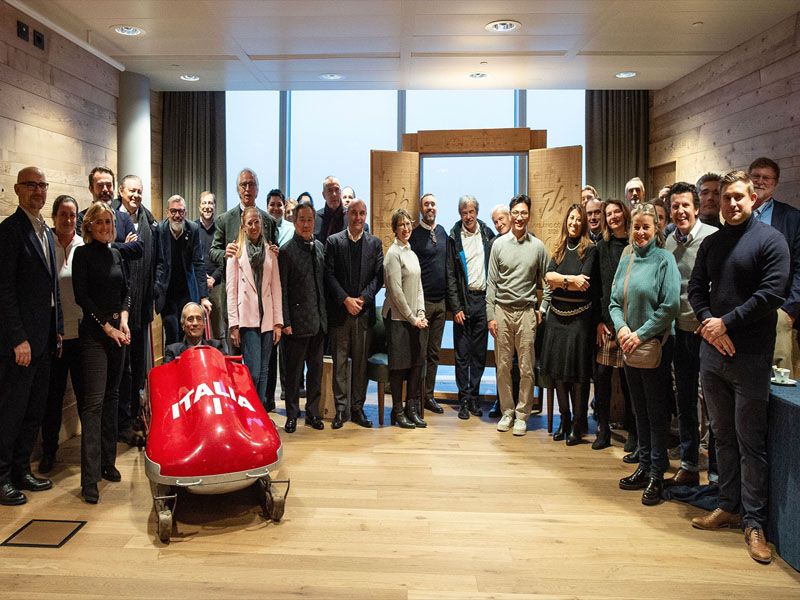The International Olympic Committee (IOC)’s Coordination Commission for the Olympic and Paralympic Winter Games Milano Cortina 2026 was able to meet in person for the first time this week in the host city of Milan. It provided an opportunity for the Organising Committee team to share the evolution of their Games preparations as they transition to the operational phase under the leadership of the recently appointed CEO, Andrea Varnier.
The face-to-face meetings allowed for in-depth conversations during which the Organising Committee outlined the strong foundations built in preparation for delivering the Games in 2026. The IOC’s Coordination Commission subsequently identified several priorities for the coming months, which include growing the domestic partner programme, optimising the budget, advancing venue preparations and enhancing the Organising Committee team.
Speaking about these updates, IOC Coordination Commission Chair Sari Essayah said: “Meeting together for the first time allowed for a number of constructive discussions with Milano Cortina 2026, while also providing an opportunity to meet new CEO Andrea Varnier. His experience in the Olympic and Paralympic Movement, and the vision and energy he expressed during our meetings, were welcomed by the Commission. Such qualities will provide the necessary boost to the team as they look to advance Games preparations.”
She continued: “With a highly qualified and enthusiastic team in place, experienced delivery partners, full support across all political levels and strong relationships with Olympic and Paralympic stakeholders, the Organising Committee is making positive progress towards the Games in 2026.”
Milano Cortina 2026 President Giovanni Malagò added: “The innovative and creative city of Milan is one of the most dynamic cities in Europe: I was pleased to welcome and to host the Coordination Commission here this week. It’s the first international meeting for Andrea Varnier as our new CEO. His collaboration as advisor to the IOC and more than 30 years of experience in the industry are the key to accelerating our roadmap. His appointment represented a fundamental step: he is the ideal candidate to lead the Fondazione Milano Cortina 2026 into its next phase of development.
“During these three days of meetings, the Commission members heard updates on our milestones and visited several venues across the city, including the iconic Stadio Giuseppe Meazza in the San Siro sport district, where the CoCom Members met with some primary school pupils. Our ambition is that all children born after 2010 will play sport regularly and use sport to understand cultural diversity, use sustainable means of transport only and grow up in a more inclusive and integrated society. Legacy plans were also detailed, with the collective goal of leaving future generations with arenas and mobility infrastructure that are all financially sustainable. Milano Cortina’s project is completely aligned with Olympic Agenda 2020+5 and its vision for cost-effective Games that take advantage of existing facilities and expertise. Close collaboration between all stakeholders is crucial to developing this unique project.”
During the three-day visit, the Coordination Commission received updates on venues. This included a tour of some of the Games-time venues: the Olympic Village in Milan, the iconic San Siro stadium – which will host the Olympic Winter Games Opening Ceremony, the International Broadcast Centre and Main Press Centre, and the Assago Arena, which will host the figure skating and short track speed skating events. Milano Cortina 2026 also introduced the IOC Commission members to their staff at their headquarters.
From a commercial perspective, 2023 will be an important year. In this respect, the growing motivation amongst potential domestic partners to embrace the Games was highlighted, and consequently the IOC Coordination Commission’s expectation to capitalise on this interest to increase revenues. This builds on the agreements finalised with several domestic partners in recent months.
Considering budgets, and the ongoing global economic challenges, the IOC Coordination Commission and the Organising Committee also discussed the extensive efforts being undertaken to optimise these Games. While striving to maintain Milano Cortina 2026’s unique vision, this work will benefit from the IOC’s Games Optimisation Group, while building on the recommendations of Olympic Agenda 2020+5 and the New Norm.
These recommendations also underpin Milano Cortina 2026’s sustainability and legacy efforts, for which they detailed their strategy and upcoming projects. The key focus in this area is on making the Games climate neutral, ensuring that the Games will bring long-term benefit to the host territories, and engaging people in physical activity at levels similar to pre-COVID times.
Interest amongst the general public was another area highlighted, with a growing number of fans eager to connect with Milano Cortina 2026. Audiences have increased in recent months thanks to regular engagement activities, in particular around the Beijing 2022 Olympic and Paralympic Winter Games, when the Olympic and Paralympic flags were handed over during Closing Ceremonies.
In addition, the Organising Committee team summarised their plans to enhance their workforce as they prepare to move to a more operationally focused approach in 2023. In doing so, they will build from a solid base, with the Commission acknowledging the strength and enthusiasm of the Milano Cortina 2026 team. This is complemented by experienced operators already working for delivery partners in the mountain regions that regularly host world-class events during the winter season.
Throughout this week’s discussions, the organisers reiterated their commitment to strengthening relationships with the various stakeholders to ensure that Games delivery commitments are met. This assurance was reciprocated by the various International Federation, National Olympic Committee and other Games stakeholder representatives attending the meetings. Continued collaboration is also evident across all political levels in Italy, reinforced through the recent restructuring of Milano Cortina 2026’s management team, with the State, provinces and host cities’ support crucial to making the 2026 Games a success.
The Olympic Winter Games Milano Cortina 2026 will take place between 6 and 22 February, with the Paralympic Winter Games taking place from 6 until 15 March.

